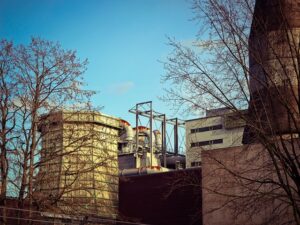Electric boilers, powered by electricity, offer efficient and environmentally friendly heating alternatives to fossil fuel systems. Modern residential models feature advanced technologies for optimal energy transfer, reducing consumption and costs. With proper installation and maintenance, these clean heating solutions minimize carbon emissions, ensuring sustainable home comfort while lowering utility bills. Adopting electric boilers represents a significant step towards eco-friendly home heating.
Discover the efficient world of electric boilers—a reliable source for consistent heating and hot water. This comprehensive guide explores the latest technology, highlighting its advantages over traditional systems. Learn how electric boilers enhance energy efficiency while reducing environmental impact. From understanding key components to installation best practices, this article covers essential aspects to help you make informed decisions. Uncover the benefits that make electric boilers a smart choice for modern homes and businesses.
- Understanding Electric Boiler Technology
- Advantages of Consistent Heating and Hot Water
- Factors Affecting Efficiency in Electric Boilers
- Installation and Maintenance Tips for Optimal Performance
- Environmental Impact and Energy Conservation Benefits
Understanding Electric Boiler Technology

Electric boiler technology has evolved significantly over the years, offering a more efficient and environmentally friendly alternative to traditional heating systems. These advanced devices use electricity as their primary energy source to provide both space heating and hot water for residential and commercial properties. Unlike fossil fuel-based boilers, electric heating systems produce no harmful emissions, making them an excellent choice for those seeking clean heating solutions.
The efficiency of modern electric boilers is a key advantage. They are designed with innovative features that optimize energy transfer, ensuring consistent and precise temperature control. This not only reduces energy consumption but also minimizes the overall cost of heating and hot water provision. Residential electric boilers, in particular, have become increasingly popular due to their ease of installation, compact design, and quiet operation, making them a practical and sustainable option for many homeowners transitioning to electric HVAC systems or looking to upgrade their existing boiler systems.
Advantages of Consistent Heating and Hot Water

Consistent heating and hot water supply are some of the key advantages offered by modern electric boiler systems. Unlike traditional central heating methods that rely on fossil fuels, electric boilers provide a cleaner and more energy-efficient heating solution. This is particularly beneficial for residential properties, as it means residents can enjoy comfortable indoor temperatures without contributing to environmental pollution.
Electric heating systems are known for their versatility and ease of use. Residential electric boilers can be easily integrated into existing plumbing systems, offering convenient hot water on demand. Moreover, the advanced technology behind these systems ensures efficient energy distribution, resulting in reduced energy consumption and lower utility bills. With electric space heating becoming increasingly popular, homes can benefit from a comfortable living environment while also contributing to a more sustainable future.
Factors Affecting Efficiency in Electric Boilers

The efficiency of an electric boiler is influenced by several key factors. One primary consideration is the type of electrical energy source. Different electric heating systems have varying efficiencies, with modern residential electric boilers often incorporating advanced technologies to optimize performance. For instance, smart electric central heating solutions can adapt to usage patterns, ensuring consistent hot water and efficient space heating.
Another significant factor is the design and insulation of the boiler itself. Energy-efficient heating systems prioritize well-insulated components to minimize heat loss during the heating process. Modern electric HVAC systems, including home heating boilers, employ innovative electric heating technology that enables faster heating times while maintaining exceptional energy efficiency. Clean heating systems, like those powered by electricity, offer a more sustainable alternative, reducing carbon emissions and contributing to a greener environment compared to traditional boiler systems.
Installation and Maintenance Tips for Optimal Performance

Proper installation and regular maintenance are key to getting the most out of your electric boiler. Start by ensuring a level and secure mounting, with adequate clearance around the unit for optimal airflow. Connect it to a reliable power source, following manufacturer guidelines strictly. For residential electric boilers, consider professional installation to guarantee safety and efficiency. Regular cleaning and inspection can prevent clogs and corrosion, enhancing energy-efficient heating performance.
Maintain a consistent supply of clean water, checking for any leaks or pressure issues. Keep the boiler’s surroundings clear of debris, allowing efficient heat exchange. Timely maintenance ensures your electric central heating system operates smoothly, providing hot water and space heating without interruption. Remember, a well-maintained electric HVAC system not only contributes to comfortable living but also reduces energy consumption, making it an eco-friendly choice.
Environmental Impact and Energy Conservation Benefits

The adoption of electric boilers offers a significant shift towards more sustainable and environmentally friendly home heating solutions. Traditional gas-fired boiler systems emit greenhouse gases, contributing to climate change. In contrast, electric heating systems produce minimal direct emissions, making them a cleaner alternative. This transition is particularly relevant in residential settings, where the use of electric central heating can substantially reduce carbon footprints.
Energy conservation is another critical benefit associated with electric boilers and electric HVAC systems. These modern devices are designed to be highly efficient, utilizing advanced electric heating technology to maximize energy transformation into usable heat. Unlike older boiler systems, residential electric boilers consistently maintain efficiency levels, ensuring that every unit of energy consumed results in effective heating or hot water production. This efficiency translates to lower energy costs for homeowners and reduced strain on the environment.
An electric boiler offers a reliable and efficient heating solution, ensuring consistent comfort with its ability to provide hot water on demand. By understanding the technology behind these boilers and considering factors like energy efficiency, one can make an informed choice for their home or business. With proper installation, maintenance, and awareness of environmental impacts, electric boilers prove to be a sustainable and cost-effective option for meeting heating and hot water needs, making them a game-changer in modern home comfort.






